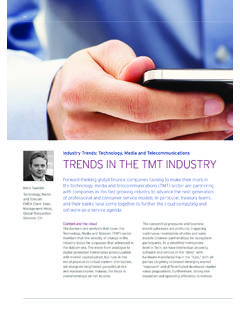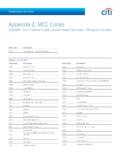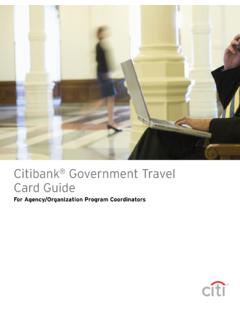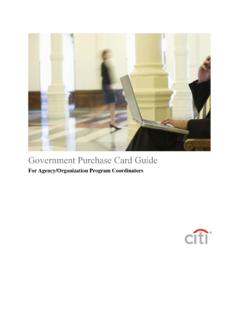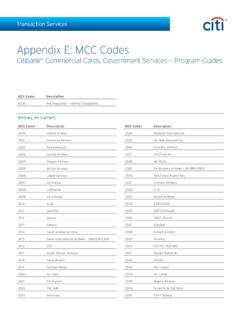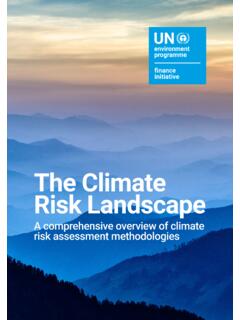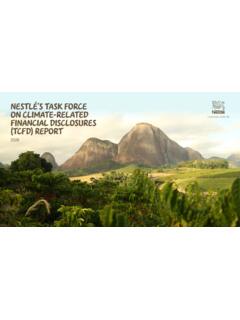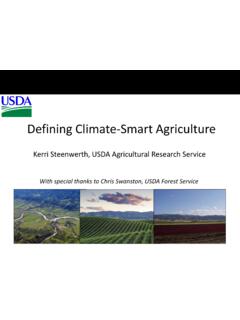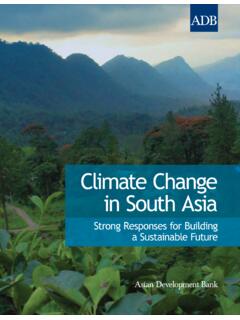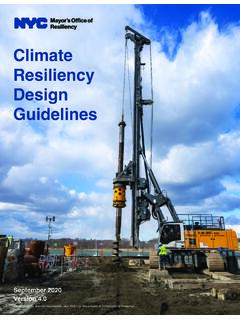Transcription of Taskforce on Climate-Related Financial Disclosures Report 2021
1 Taskforce on Climate-Related Financial Disclosures Report 2021 Citi s Approach to climate Change and Net ZeroAbout This ReportThis Report presents information on Citi s efforts towards implementing the recommendations of the Task Force on Climate-Related Financial Disclosures (TCFD). This is our third standalone TCFD Report since we began reporting using the TCFD framework in Report reflects a summary of our progress made to date towards our goal of incorporating climate risk and opportunity identification and management into our overall business strategy and disclosure efforts. climate scenario analysis is a rapidly evolving area for many companies, including Citi, and we expect the methodology and tools for conducting such analysis to continue improving over time. climate data, including the quantification of the greenhouse gas (GHG) emissions associated with our clients, will also continue to evolve, and we expect to update our disclosed data in the future. This Report represents an important step upon which we will continue to build in order to expand our understanding of climate risks and opportunities moving has committed to achieving net zero emissions associated with our financing by 2050, and net zero emissions for our operations by 2030.
2 This Report includes our initial assessment of our baseline emissions and 2030 targets for our Energy and Power loan portfolios as well as the methodology used for these calculations and initial transition plans for these sectors. Our climate risk and net zero work are related and reinforce each other. Whereas our climate risk work focuses on the integration of climate risk into Citi s risk management governance, processes and strategies, our net zero work focuses on Citi s impacts on the climate and achieving our net zero emissions targets. Common linkages exist between the two workstreams. For example, both rely on common data elements such as GHG emissions and better understanding of our clients climate change mitigation and/or adaptation plans. Additionally, risk management tools can help achieve our net zero goals and our net zero plan can drive risk mitigation, particularly for credit, strategic and reputation risk. ContentsLetter from the CEOPart 1: Introduction Part 2: Governance Part 3: Strategy Part 4: Risk Management Part 5: Metrics & Targets Part 6: Looking Forward Appendices 0305101640486468 TCFD Report 2021: CITI S APPROACH TO climate CHANGE AND NET ZERO | 3We know it is not enough to say Citi is committed to tackling climate change.
3 That s the easy part. As the world s most global bank, we can help drive the transition to a net zero economy and make good on the promise of the Paris Agreement. We also know that the world has substantial energy needs and different countries are in different stages of development. I want to make sure Citi s transition plan reflects these realities. Citi s Net Zero Transition Principles, which we have developed to serve as our North Star, will guide our efforts. In developing our path to net zero emissions by 2050, we are building on our sustainability track record of more than two decades and have set bold goals and commitments to accelerate this transition, including our recent $1 trillion sustainable finance goal. As we continue to finance clean energy solutions, realign our business models and work towards a net zero future, we know we cannot do this alone. Tackling climate change will require tremendous collaboration from everyone our clients, industry peers, investors, NGO partners and in particular, governments around the world.
4 There is a critical need for strong public policy to accelerate the global economy s transition to net zero. Getting to net zero means we must support our clients in their own transitions to net zero, and we must understand where they are in their journeys to make progress. Our intention is to work with all our clients, including our fossil fuel clients, to develop credible plans and transition to net zero together. We will also encourage the responsible retirement of carbon-intensive assets rather than divestment as part of these transition plans. We will continue to assess our client relationships a regular part of how we manage our business and prioritize partnering on transition strategies before turning to client exits as a last resort. Efforts from the private sector must be complemented by governmental action to create the conditions we need to meet our climate commitments while remaining competitive in the global market including policies that drive consistent standards for climate disclosure.
5 We encourage the development of harmonized data Disclosures using frameworks like the Task Force on Climate-Related Financial Disclosures (TCFD) to guide the private sector forward, especially as we see more and more institutions pledging to reach net zero. Our TCFD Report includes our 2030 emissions targets for the Energy sector, a 29% absolute reduction in financed emissions, and for the Power sector, a 63% reduction in portfolio emissions intensity which put us firmly on track to meet our 2050 net zero commitment. We will need to actively engage with our clients across all relevant sectors to map out what decarbonization pathways look like for each industry. And in our efforts, we want to ensure we re supporting a responsible transition for all, particularly in developing countries where there may be limited access to energy and the resources needed for the transition. We will strive to meet the current needs of developing countries without causing negative social impacts or exacerbating existing inequalities, so that we can help these markets prioritize the transition to net zero while balancing both environmental and social needs.
6 Letter from the CEO4 | TCFD Report 2021: CITI S APPROACH TO climate CHANGE AND NET ZEROC limate data, disclosure and technologies continue to evolve, and we will adapt to the changing landscape as we pursue our net zero commitment and transition. Although there are many uncertainties, metrics and data like those outlined in the pages that follow are essential to helping us understand where we are and how we move forward. And as we continue to build out our plan to reach net zero, one thing will remain constant: we will continue to be transparent and accountable. We will continue to share how we are assessing and managing our net zero plan and broader climate strategy, integrating climate risk and transition finance opportunities into our business and overall strategy and reporting on our progress. This Report represents our continued leadership in climate change and disclosure in line with the TCFD recommendations and the progression of our efforts over the years. It has the full support of our management team, and our net zero plan was reviewed by our Board of Directors.
7 Since publishing our second TCFD Report in 2020, we formed a new Global ESG Council consisting of senior members of management and grew our dedicated climate Risk team to include expertise in credit risk, scenario analysis, stress testing and regulatory engagement. We also formed the Natural Resources & Clean Energy Transition team by combining the expertise and knowledge of existing teams to more effectively drive client engagement efforts in the energy, power and chemicals sectors. The existential threat posed by climate change will be with us for generations, but we know that it is this generation s time to act. We will act with urgency while understanding that our work to achieve net zero will not be a short-term effort. Supporting a fair and inclusive transition remains a top priority for Citi. This is part of who we are, and we will continue to learn and lead as the global community enters this next critical stage of climate Fraser | Chief Executive Officer, CitiTCFD Report 2021: CITI S APPROACH TO climate CHANGE AND NET ZERO | 5 Introductory StatementsOn March 1, 2021, her first day as CEO, Jane Fraser announced Citi s commitment to achieving net zero GHG emissions by 2050, a significant target given the size and breadth of our organization s portfolios and businesses.
8 Citi made this commitment as part of its ongoing work to address the challenges that climate change poses to our economy and society. Fraser s announcement demonstrated how identifying, assessing and managing Climate-Related risks and opportunities remains a top business priority for Citi. This Report updates our 2020 Report and was developed to provide our stakeholders with information on our continued progress to address climate risk and to fulfill our commitments to publish an initial net zero plan within one year of announcing this ambition. Note that this Report contains our initial net zero plan for our Energy and Power loan portfolios; the net zero plan for our operations will follow later in the past 20 years, Citi has progressively built our understanding of Climate-Related risks and opportunities, updated our climate governance structure and pushed ourselves to set and achieve increasingly ambitious goals. We are proud of our demonstrated record of participating in the creation and adoption of external principles and standards for Climate-Related issues, and we believe we have the opportunity and responsibility to be a leader in helping to drive the transition to a net zero economy.
9 Introduction PART 16 | TCFD Report 2021: CITI S APPROACH TO climate CHANGE AND NET ZEROT imeline of climate Action1997 Joined the UN Environment Programme Finance Initiative (UNEP FI)2003Co-created the Equator Principles and established Citi s broader Environmental and Social Risk Management Policy2015 Launched first Sustainable Progress Strategy and $100B Environmental Finance GoalSigned the Natural Capital Declaration2017 Announced goal to source 100% renewable electricity for our facilities by 2020 Joined the RE100 commitment to 100% renewable electricity2019 Issued inaugural 1B green bondFirst signatory of the Principles for Responsible BankingCo-developed the Poseidon PrinciplesJoined 2o Investing Initiative s Paris Agreement Capital Transition Assessment (PACTA) Pilot Program2021 Announced net zero emissions by 2050Co-founded the Net-Zero Banking Alliance Partnered with the UN Framework Convention on climate Change (UNFCCC)Joined Breakthrough Energy Catalyst as an anchor partner and also joined the RMI Center for climate Aligned Finance2007 Issued our first climate Change Statement, supporting a globally connected market-based climate policyFirst bank to set a GHG reduction targetLaunched 10-year $50B climate Initiative2014Co-created The Green Bond Principles2018 Published first climate risk disclosure TCFD Report Signed We Are Still In Declaration in support of the Paris Agreement2020 Launched the Sustainable Progress StrategyLaunched Impact Investing FundIssued $ green bondJoined Partnership for Carbon Accounting Financials (PCAF)Published second climate risk disclosure TCFD Report Finance for a climate -Resilient Future Citi s TCFD ReportFinance for a climate -Resilient Future II Citi s 2020 TCFD ReportTCFD Report 2021.
10 CITI S APPROACH TO climate CHANGE AND NET ZERO | 7We are continuing to evolve and take the lessons learned from our various climate pilot programs and work to integrate them into our core businesses to enhance our climate expertise. We are now applying those lessons learned and leveraging our improved internal governance to advance our net zero plan. We are proud of the work we have done to develop our climate initiatives and to support our clients in the transition toward a low-carbon economy, and we are thrilled to see the growing momentum behind recent similar announcements. Currently, hundreds of governments, companies, NGOs and investors including pension funds and insurers responsible for directing trillions of dollars in investments have committed to achieving net zero investment portfolios by Participation in Key Net Zero FrameworksIn 2021, we continued to expand our participation in the Financial industry s net zero leadership initiatives. Citi is a member of multiple frameworks that enhance our understanding of Climate-Related issues, improve our access to data and promote efficient communication and coordination across the various climate Of these frameworks, the Partnership for Carbon Accounting Financials (PCAF), the Net-Zero Banking Alliance (NZBA), and the Glasgow Financial Alliance for Net Zero (GFANZ) are converging as net zero guideposts across the Financial industry.
